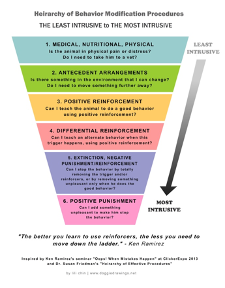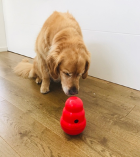Listen up Dogshare community: life is full of choices. The behaviours that produce the strongest reinforcers are the behaviours our dogs will do more. It's possible to decrease problems without resorting to punishment.
Being able to manage a dog’s behaviour by changing something in the environment is an incredible tool. It’s not always available as an option, but when it is, it can be very effective and I’m excited to share this information with you.
We must remember that behaviour always depends on the environment in some way.

See the image above, have a good read through it! When we stumble across a behavioural issue in our dogs that we want to manage/change, the very first thing we do is consider if the issue could be medical, nutritional or physical. I always tell me clients that if their dogs behaviour has just changed quite suddenly, it’s always worth a check-up from the vet before a consult with a behaviourist. Rule it out before we start to look at their behaviour.
If and when that is ruled out the next thing we do is look at the antecedent arrangement. This is a fancy way of saying – is there something in the environment that we can change to help with your dog’s behaviour? No behaviour can be understood without identifying the functionally related antecedents and consequences. In other words, there is never just behaviour. Whenever a behaviour is performed, there are related antecedents that set the occasion for the behaviour, and consequences that increase or decrease its future probability of the behaviour occurring again. Don’t worry if you’ve lost me here, I will give lots of examples below so you can wrap your heads around it.
As a dog owner, this can be so empowering if we can understand the strengths and limitations of how to manage the environment. In dog training terms - Management is when we rearrange the environment to help manage what is happening. Management is not a cop out, sometimes it can be the best tool. I guess a nice way to think of it is, that it’s a way to set up the environment to help set our dogs up for success. For example, something as simple as, not leaving your shoes and socks lying around if your dog keeps stealing them and chewing them. Or putting a baby gate up outside the new baby’s room if you want to keep the door open but don’t want the dog getting in.
Here’s another example… My dog Cooper loves to eat the contents of the rubbish bin in our bathroom. He only does it when I leave the house. It’s frustrating because I come home to such a mess. But there is no point in getting angry as he won’t understand. So, let’s think about it, he doesn’t do this when I’m home. Only when I’m out. Which makes it hard to fix as I’m never there to see it happening. So instead of getting angry, I now make a big effort to close the bathroom door every time before I leave the house. Simple. Problem solved. Additionally, I often give him treat dispensing toy (i.e. a kong wobbler) when I leave the house just to give him something to enjoy and associate with me leaving.

Another example I have implemented recently in my home is actually with my 3-year-old son (I love how dog training is so relatable to my kids too). Every night in the shower he was making the biggest mess emptying out all the shampoos, conditioners, soaps. It was infuriating me. I was getting angry at him and he wasn’t listening. It was a vicious cycle and he just kept doing it. But all of a sudden, I had this light bulb moment… What could I change in the environment to set him up for success? I could literally just move everything away besides the one soap he was allowed to use. Let’s just say, shower time, is way more enjoyable now for all of us!
One more example, when I was working as a dog walker, I walked the most gorgeous golden retriever. She was great on the lead, except for when I walked past this one house. She would pull so hard that I was nervous one day she would get away as she was so strong. Besides for that one house she was great on the lead. The dogs on the other side of the fence must have given her a fright once. So, instead of walking past it over and over and making her more
Mel Ritterman is a qualified dog trainer and mum-of-three. You can find more information about Mel on her website Cooper and Kids, or follow her on Instagram or Facebook. If you have a question for Mel feel free to email her at [email protected].
Disclaimer: Dogshare and Mel Ritterman will not be liable for anything that happens to you or your dog by following our advice and tips. If you have real concerns or worries about your dog, please seek out a professional vet or behaviourist to come and assess the situation.
Cover Photo by Humphrey Muleba